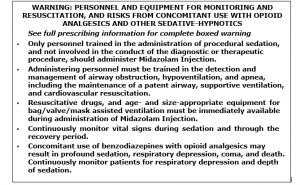WG Critical Care Announces First and Only FDA-Approved, Ready-To-Use Midazolam in 0.9% Sodium Chloride Injection CIV
The launch of Ready-To-Use Midazolam in 0.9% Sodium Chloride Injection CIV follows the highly successful first and only FDA-approved RTU Calcium Gluconate in Sodium Chloride Injection in single-dose bags launched in 2019.
“WG Critical Care is proud to introduce Ready-To-Use Midazolam in 0.9% Sodium Chloride Injection CIV to the US market. I’m excited to offer another FDA-approved product consistent with our vision of introducing Smart Solutions that increase efficiency and safety for clinicians and patients in the hospital setting. The launch of RTU Midazolam injection comes at a critical time to help address the current market shortage,” says Ron Mannino R.Ph, Past President of the New Jersey Pharmacist Association and CEO of Pharmasphere, Inc.
Midazolam in 0.9% Sodium Chloride Injection CIV will be available in 2 presentations, 50 mg/50 mL (1 mg/mL) and 100 mg/100 mL (1 mg/mL) ready-to-use single-dose bags, and is a patented formulation. The RTU formulation is a subset of a multimillion-dollar Midazolam market. In 2020, over 47 million units of Midazolam were sold in the US, resulting in more than $93 million in sales, according to IQVIA data.
“I think an FDA-approved Ready-To-Use Midazolam is a better option than admixing from vials in-house or sourcing from 503B compounding facilities. Enhanced workflow saves hospital time, terminal sterilization and less handling enhances patient safety, and a 24-month shelf life reduces waste. An FDA-approved, RTU Midazolam just makes sense for hospitals,” says Clark Lyda, Lead Pharmacist, Operating Room Pharmacies, Clinical Associate Professor, University of Colorado Skaggs School of Pharmacy and Pharmaceutical Sciences.
Midazolam Injection is currently on the FDA and ASHP drug shortage list of essential medications. The launch of Midazolam in 0.9% Sodium Chloride Injection CIV will help to reduce supply issues experienced in the US.
About Ready-To-Use Midazolam in 0.9% Sodium Chloride Injection CIV
Midazolam in 0.9% Sodium Chloride Injection CIV, Ready-To-Use is a patented formulation (patent number 10,996,990) of midazolam, provided as a premixed solution in single-dose flexible bags, stable at room temperature (up to 25 °C) for 24 months.
Midazolam in 0.9% Sodium Chloride Injection CIV is available in 2 presentations,
50 mg/50 mL (1 mg/mL) and 100 mg/100 mL (1 mg/mL), and is a clear, colorless solution supplied in single-dose bags.
Midazolam in 0.9% Sodium Chloride Injection CIV is a benzodiazepine indicated for
continuous intravenous infusion for sedation of intubated and mechanically ventilated adult, pediatric, and neonatal patients as a component of anesthesia or during treatment in a critical care setting.
IMPORTANT SAFETY INFORMATION
------------------------------ CONTRAINDICATIONS ---------------------------
Midazolam in Sodium Chloride Injection is contraindicated in patients with:
• known hypersensitivity to midazolam.
• acute narrow-angle glaucoma.
----------------------- WARNINGS AND PRECAUTIONS ----------------------
Cardiorespiratory Adverse Reactions: Serious cardiorespiratory adverse reactions have occurred, sometimes resulting in death or permanent neurologic injury.
Paradoxical Behavior: Agitation, involuntary movements (including tonic/clonic movements and muscle tremor), hyperactivity, and combativeness have been reported in both adult and pediatric patients.
Dependence and Withdrawal with Long-Term Use: Use for several days to weeks may lead to physical dependence to midazolam. Do not abruptly discontinue midazolam. Gradually taper the dosage using a tapering schedule that is individualized to the patient.
Debilitation and Comorbid Considerations: Higher-risk adult and pediatric surgical patients, elderly patients, and debilitated adult and pediatric patients require lower dosages, whether or not concomitant sedating medications have been administered.
Risk of Intra-Arterial Injection: There have been limited reports of intra- arterial injection of midazolam. Adverse events have included local reactions, as well as isolated reports of seizure activity in which no clear causal relationship was established.
Impaired Cognitive Function: Because of partial or complete impairment of recall, patients should not operate hazardous machinery or a motor vehicle until drug effects have subsided.
Hypotension and Seizure in Preterm Infants and Neonates: Avoid rapid injection in the neonatal population.
Neonatal Sedation in Later Stages of Pregnancy: Benzodiazepine use during later stages of pregnancy can result in neonatal sedation. Observe newborns for signs of sedation and manage accordingly.
Pediatric Neurotoxicity: In developing animals, exposures greater than 3 hours cause neurotoxicity. Weigh benefits against potential risks when considering elective procedures in children under 3 years old.
------------------------------ ADVERSE REACTIONS ---------------------------
The most common adverse reactions (≥15%) were decreased tidal volume, decreased respiratory rate, and apnea.
To report SUSPECTED ADVERSE REACTIONS, contact WG Critical Care, LLC at 1-866-562-4708 or FDA at 1-800-FDA-1088 or
www.fda.gov/medwatch.
------------------------------ DRUG INTERACTIONS ----------------------------
Opioid Analgesics and Other Sedative Hypnotics: Risk of respiratory depression is increased.
Cytochrome P450-3A4 Inhibitors: May result in prolonged sedation due to decreased plasma clearance of midazolam.
----------------------- USE IN SPECIFIC POPULATIONS ----------------------
Lactation: A lactating woman may pump and discard breast milk for 4 to 8 hours after treatment with midazolam.
Please see full prescribing information: DailyMed - MIDAZOLAM HYDROCHLORIDE injection, solution (nih.gov)
About WG Critical Care, A Pharmasphere Company
WG Critical Care, LLC (WGCC) is wholly owned by Pharmasphere, Inc. Pharmasphere and its affiliates market an extensive line of FDA-approved anti-infectives and other critical care products. Their focus is to supply conventional injectable products and convenient drug formulations that help increase efficiency and safety in the hospital setting. WGCC and its affiliates bring over 35 years of experience in finished-dose and API development and manufacturing. WGCC is headquartered in Paramus, New Jersey. Please visit www.wgccrx.com for more information on the WGCC full line of essential injectable products.
WGCC – Smart Solutions to increase efficiency for clinicians, safety for patients
Ariel Kramer
Circa Healthcare
+1 484-550-5992
email us here
Legal Disclaimer:
EIN Presswire provides this news content "as is" without warranty of any kind. We do not accept any responsibility or liability for the accuracy, content, images, videos, licenses, completeness, legality, or reliability of the information contained in this article. If you have any complaints or copyright issues related to this article, kindly contact the author above.

